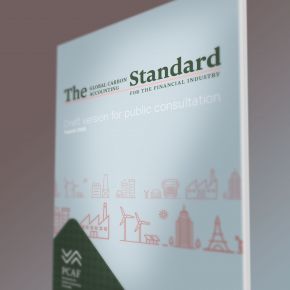The first global standard for financial institutions to measure and track the climate impact of their lending and investment portfolios has been released by the Partnership for Carbon Accounting Financials (PCAF).
PCAF, a global collaboration of 70 financial institutions with total financial assets of more than $10tr, is publicly releasing a standard to provide financial institutions with shared methodologies and rules for measuring and disclosing the greenhouse gas emissions of their loans and investments.
Developed by a group of 16 banks and investors worldwide, the standard will ensure a common set of robust carbon accounting methods to assess and track the emissions financed by loans and investments. These included ABN AMRO, Access Bank, Amalgamated Bank, Banco Pichincha, Bank of America, Boston Common Asset Management, Crédit Coopératif, FirstRand, FMO, KCB, LandsBankinn, Morgan Stanley, Produbanco, ROBECO, Triodos Bank and Vision Banco.
The Global Carbon Accounting Standard is based on carbon accounting methods already being used in several countries by banks and investors affiliated with the PCAF.
“Until now, there was no global, harmonised way for financial institutions to measure and disclose their financed emissions. But today, banks and investors across the globe have access to a standardised approach to measure the climate impact of lending and investment portfolios” said Giel Linthorst, executive director of PCAF and director at Guidehouse.
Beyond assessing, tracking and reporting financed emissions, a consistent and harmonised approach to portfolio carbon accounting gives financial institutions the information required to set climate targets and asses climate transition risks. As such, the Global Carbon Accounting Standard feeds into the work of other climate initiatives, such as the Carbon Disclosure Project (CDP), Science Based Target initiative (SBTi) and the Task Force on Climate-related Financial Disclosures (TCFD).
PCAF is running a public consultation on the Standard to 30 September 2020, and seeks feedback from financial institutions, policy makers, regulators, data providers, NGOs, consultants and other interested parties on the robustness and applicability of the methodologies in the Standard. The consultation will be run via webinars and an online feedback survey. The final version of the Standard will be published in November of 2020.
Latest News
-
Myanmar earthquake: Co-operative bank launches emergency fundraising appeal
-
New corporate partnership launches to assess quality across Age UK network
-
Children's hospital to benefit from auction firm's £200,000 anniversary fundraiser
-
Electrolux doubles recycled materials target
-
Car firm pledges £1m to support environmental and humanitarian causes
-
TransUnion raises £44.8k for suicide prevention charity and other good causes
© 2019 Perspective Publishing Privacy & Cookies









Recent Stories